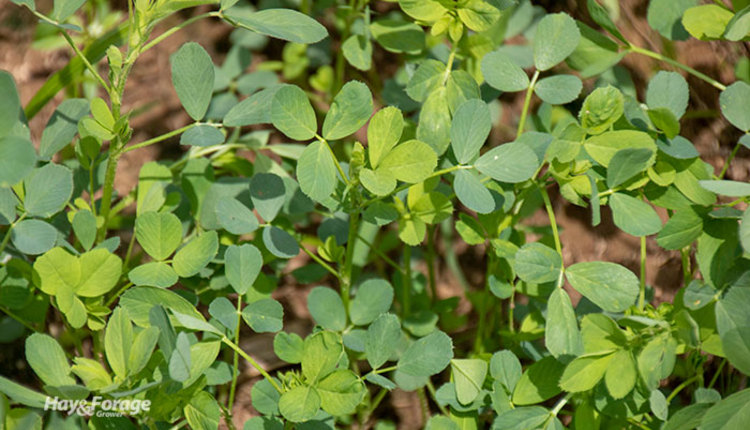
As a county extension agronomist, I worked in a region where the native soil pH hovered around 7. It was a great economic advantage to alfalfa growers because the crop demands a pH somewhere north of 6.5.
Unlike my situation, many regions of the U.S. have acidic soils. A major problem with low soil pH is aluminum toxicity. In acidic subsoils, aluminum becomes soluble and more available for plant uptake.
Too much available aluminum has the effect of slowing and pruning alfalfa root growth. This, in turn, reduces the activity and ability of Rhizobia bacteria to inhabit root nodules and fix nitrogen for the plant.
Aluminum toxicity is best mitigated by correcting a low soil pH with an application of agricultural lime — preferably six months to a year before an alfalfa seeding is made.
Gypsum may help, too
Research has shown that even with a lime application, subsoil pH may remain low and aluminum toxicity can still be an issue. To resolve this situation, gypsum applications may help.
Gypsum, which is calcium sulfate, won’t raise the soil pH, but the high volume of calcium will displace the aluminum on subsoil particles; this allows it to be leached below the rooting depths when enough moisture is available.
Research from the University of Georgia showed that alfalfa root growth increased 200% at a depth of 2.5 feet where gypsum had been applied. A subsoil (deeper than 15 inches) soil test is recommended to confirm if a gypsum application is warranted to reduce potential aluminum toxicity issues from low pH and high aluminum availability. Toxicity is likely when the subsoil pH trends below 5.5.
To ensure proper root growth, alfalfa needs moisture, an abundance of calcium at the root tip, and an absence of aluminum. The sulfate in the gypsum binds and precipitates out the aluminum. Coupled with the added calcium, this enhances the subsoil rooting environment, especially in fields where soil pH has been low for an extended period of time.
Gypsum applied alone will have no impact on soil pH. It must be used in conjunction with agricultural lime and a recommended fertilizer program. A well-drained site is also important for sustained alfalfa production, which is true regardless of the native soil pH.

